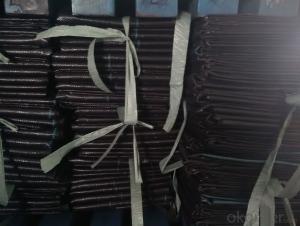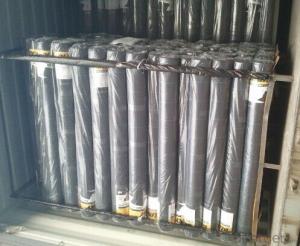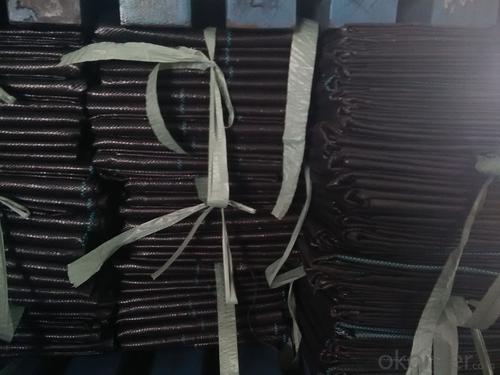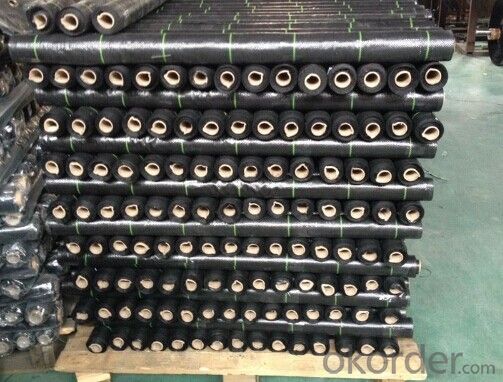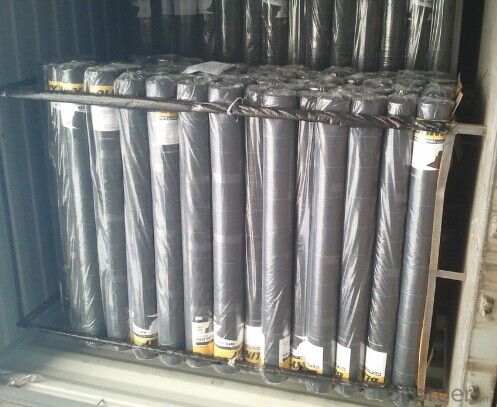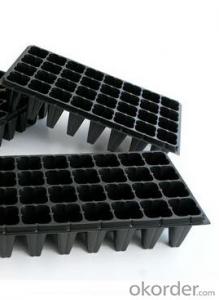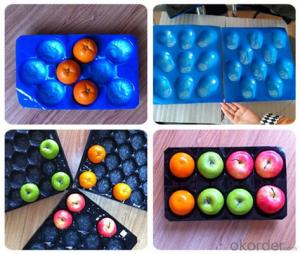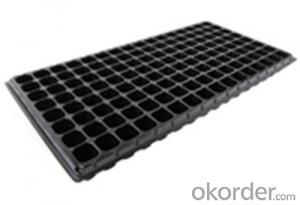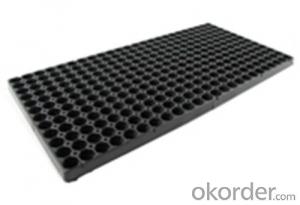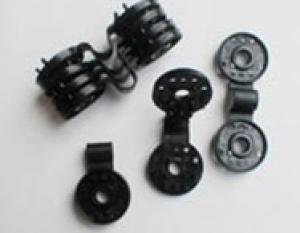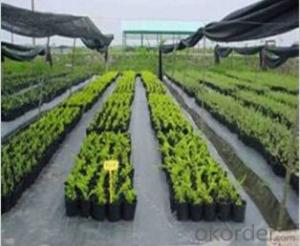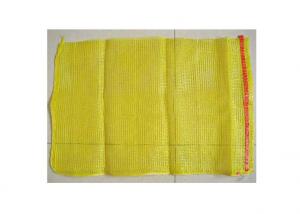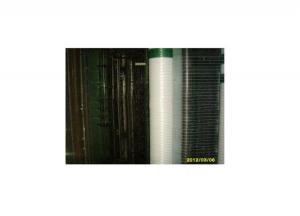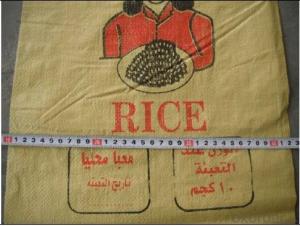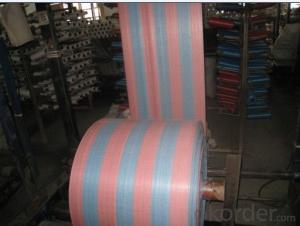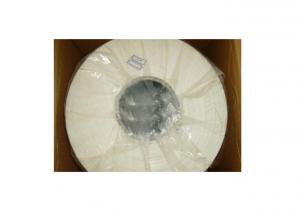black plastic mulch
- Loading Port:
- China Main Port
- Payment Terms:
- TT OR LC
- Min Order Qty:
- -
- Supply Capability:
- -
OKorder Service Pledge
OKorder Financial Service
You Might Also Like
The company mainly produces anti grass cloth, earthwork cloth, cloth and so on, weight can be produced in 80--150g/m2. Specifications 1*10M. 1*20.1*50 1*100 2*100 etc. (width maximum energy of 5.25 meters, length can be customer specified) week production in about 10 tons. Perennial sold to Japan, Germany, France, New Zealand and so on, anti grass cloth after the relevant institutions in Germany through the relevant certification, SLG certification and so on.
Anti grass cloth has the following effects:
1 Prevent the ground produces weeds. Because cloth can prevent sunlight directly irradiating on the ground (especially black cloth), while using the cloth itself is a solid structure to prevent weed through the cloth, thus ensuring the inhibitory effect of cloth on the growth of weeds.
2 Promptly remove ground water, keep the floor clean. The drainage performance cloth ensures rapid discharge of ground water, and anti permeability gravel layer under the cloth and sand can effectively restrain soil particles, thus ensuring the cloth surface cleaning.
3 Be conducive to the roots of the plant growth, prevent root rot. The role of woven laying structure also stems from the cloth, this structure can ensure the crop root does not have water, so that the roots of the air with a certain degree of mobility, thereby preventing root rot.
4 Prevent additional potted plant root growth, improve the quality of potted flowers. When the flower production in cloth, cloth can prevent the basin roots out of the pelvic floor drill into the ground, so as to ensure the quality of potted flowers.
5 Be conducive to the cultivation and management: most are woven cloth marked one-way or two-way line, flower pots placed or arranged cultivation medium in the greenhouse or outdoors, can according to these markings to accurately arrange.
- Q: How do agricultural plastic products help with fruit preservation?
- Agricultural plastic products help with fruit preservation by providing a protective barrier that prevents moisture loss, reduces the risk of physical damage, and inhibits the growth of bacteria and fungi. This can extend the shelf life of fruits, maintain their quality, and minimize post-harvest losses.
- Q: The flow rate for plastic pipe should not exceed?
- Plastic pipe is only rated for static (burst) pressure and working pressure within a specified temperature range, not flow rate. Since there is friction between the walls of a pipe and the fluid flowing in it, if one has a very long, open-ended pipe, one could theoretically reach or exceed the rated pressure of the pipe at the pumping end with maximum unrestricted flow. If one could calculate these values, it would give the maximum flow rate that should not be exceeded. However, since fluids have mass, suddenly closing the discharge end of the pipe could result in transient pressures that exceed the burst pressure of the pipe.
- Q: Aside from the resin and the fillers, can you state the other components of plastics in lay-man's term please. Give examples also. Thank you! :))
- Most plastics are made of some type of polymer, which is just a really, really, really big molecule. These can be crazy-long chains of carbons and other groups, and depending on what those groups are, your plastic can be strong and tough, or soft and flexible - or even heat-resistant. It is the structure of the polymer in the plastic that determines how the plastic behaves. Does that help?
- Q: Are there ground cover plants that can tolerate salt spray?
- Yes, there are several ground cover plants that can tolerate salt spray. Some common examples include beach grass (Ammophila breviligulata), sea thrift (Armeria maritima), and seaside goldenrod (Solidago sempervirens). These plants have adapted to coastal environments and can withstand the high levels of salt in the air.
- Q: What are the different types of agricultural plastic planters and pots?
- There are various types of agricultural plastic planters and pots available in the market. Some common types include nursery pots, seedling trays, hanging baskets, grow bags, and raised bed containers. Each type serves a specific purpose and is designed to accommodate different stages of plant growth or specific plant varieties.
- Q: How do agricultural plastic products help with fruit protection from birds?
- Agricultural plastic products, such as bird netting or bird scare tape, create a physical barrier that prevents birds from accessing and damaging fruits. This protective layer acts as a deterrent, reducing the risk of bird infestation and allowing the fruits to grow and ripen undisturbed.
- Q: Can nursery trays be used for both indoor and outdoor plants?
- Yes, nursery trays can be used for both indoor and outdoor plants.
- Q: Are nursery trays suitable for starting a vegetable container garden?
- Yes, nursery trays are suitable for starting a vegetable container garden. They provide a convenient and organized setup for seed starting, allowing for proper drainage and easy transplanting. However, it is important to ensure that the trays are clean and have enough depth for root growth. Additionally, once the seedlings have grown, they should be transplanted into larger containers or directly into the ground for optimal vegetable growth.
- Q: Explain the ways in which farmers utilize agricultural plastic bags to enhance soil quality.
- <p>Farmers use agricultural plastic bags primarily for mulching, a practice that can significantly improve soil quality. Mulching with plastic helps retain soil moisture, reducing the need for irrigation and promoting plant growth. It also suppresses weed growth, conserving soil nutrients that would otherwise be competed for by weeds. Additionally, plastic mulch can increase soil temperature, which is beneficial for early-season planting and germination. Over time, as the plastic degrades, it can improve soil structure by adding organic matter, although the environmental impact of plastic degradation must be considered. These methods collectively enhance fertility, aeration, and overall soil health, leading to increased crop yields and quality.</p>
- Q: What is the best way to clean and sanitize nursery trays?
- The best way to clean and sanitize nursery trays is to first remove any soil or debris from the trays using a soft brush or sponge. Next, soak the trays in a mixture of warm water and mild dish soap for a few minutes. Scrub the trays gently to remove any remaining dirt. Rinse the trays thoroughly with clean water. Once the trays are clean, sanitize them by soaking them in a solution of 1 part bleach to 10 parts water for about 10 minutes. Rinse the trays again with clean water and allow them to air dry before using them again.
Send your message to us
black plastic mulch
- Loading Port:
- China Main Port
- Payment Terms:
- TT OR LC
- Min Order Qty:
- -
- Supply Capability:
- -
OKorder Service Pledge
OKorder Financial Service
Similar products
Hot products
Hot Searches
Related keywords
